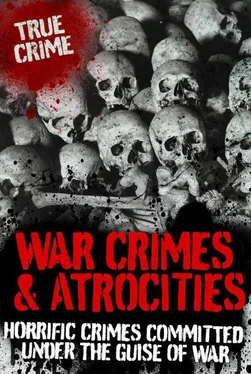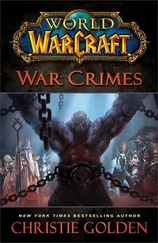THE GRIM DISCOVERY
The French remained loyal supporters of Bokassa and the French president, Valéry Giscard d’Estaing, became a close friend. He often accompanied Bokassa on hunting trips in Africa and was given uranium, which was a vital ingredient for the manufacture of France’s nuclear weapons. D’Estaing was frequently given personal gifts of gold and diamonds by Bokassa, but eventually these tokens of friendship became an embarrassment for the president. The French grew increasingly critical of the friendship, and after a riot in Bangui in 1979, which led to the massacre of many civilians, French support ran out.
Bokassa was ousted from his luxurious home when it was stormed by French troops in 1979, after they arranged a coup in order to remove him from power. Bokassa fled to the Ivory Coast. When the authorities searched his palace, Villa Kolongo, a strange smell came from the freezer. When they opened it they found the bodies of some of his political opponents, and some children, not only in the walk-in freezer, but in the bottom of his swimming pool, too.
Apparently, in 1979 Bokassa had declared that all the nation’s schoolchildren should wear uniforms and, ironically, the only producer in Bangui happened to be one of his wives. The families of the children were exceptionally poor, and they couldn’t even begin to pay for the uniforms. One day they gathered in the streets and threw rocks at Bokassa’s car as it drove past. Bokassa was furious and rounded up approximately 100 children, both innocent and guilty, and had them all murdered. Bokassa killed many himself and kept many of their remains in his freezer at his palace. In the same freezer, he kept the corpses of some of his political enemies he had eliminated, and he was said to have frequently snacked on their brains and hearts.
In 1980, Bokassa, in absentia, was condemned to death not only for mass murder but also for cannibalism. Bokassa remained in exile in the Ivory Coast for four years and then fled to France, who gave him diplomatic immunity due to his past history with the French Foreign Legion.
In 1986, Bokassa came out of exile and returned to Bangui, where he was immediately arrested and tried for treason, murder, cannibalism and embezzlement. The trial lasted for several months and, although he was cleared of the cannibalism charges, Bokassa was again sentenced to death on 12 June, 1987. In February 1988, however, his sentence was commuted to life imprisonment and then reduced further to just 20 years.
Bokassa was released from prison in 1993, when the country returned to a democratic state. Bokassa lived the rest of his life in the ruins of his former palace in Bangui. It is thought he had at least 17 wives and concubines and as many as 62 children. Bokassa died of a heart attack on 3 November, 1996.
LEGACY OF CORRUPTION AND GREED
Even today Africa remains a continent that is tangled up with poverty and corruption. Selfish leaders, such as Jean-Bédel Bokassa, have done nothing to raise the population out of a state of deprivation. He took advantage of impoverished Africans to further his own wealth, using public funds to fund his own lavish lifestyle. On top of that he was a ruthless murderer, annihilating anyone who got in his way or didn’t kowtow to his demands. His regime was most definitely characterized by many human rights atrocities.
1971–79

Idi Amin was President of Uganda from 1971 to 1979, but his term of office was witness to one of the bloodiest dictatorships in the history of Africa. Under his rule as many as 400,000 people are believed to have been killed and many more were imprisoned and tortured. Although Amin gave himself the exalted titles of ‘His Excellency President for Life’, ‘Field Marshal Al Hadji Doctor Idi Amin, VC, DSO, MC’, ‘Lord of All the Beasts of the Earth and Fishes of the Sea’ and ‘Conqueror of the British Empire in Africa in General and Uganda in Particular’, to the rest of the world he was known as the ‘Butcher of Africa’.
HIS EARLY YEARS
Idi Amin was born, Idi Awo-Ongo Angoo, between the years of 1923 and 1925, into the Kakwa tribe in Koboko, in the north-west corner of Uganda. Shortly after Amin was born, his father, a farmer and a follower of Islam, abandoned the family, leaving his son to be raised by his mother, Assa Aatte, a self-proclaimed sorceress. He was the third eldest of eight children and received only a rudimentary education, excelling in sports and reciting the Qur’an. He converted to Islam at an early age, which is when he changed his name to Idi Amin. In 1946, he joined the King’s African Rifles as an assistant cook and laundry assistant. In 1947, as a private, he transferred to Kenya for infantry service, and he was promoted to corporal in 1948.
By 1954, Amin had made the rank of effendi (or warrant officer), which is the highest possible rank for a black African in the colonial British army. He allegedly got his nickname ‘Dada’ while serving in Kenya, because every time he was caught with a woman in his tent, to avoid being punished, he pleaded that she was his dada , which is Swahili for ‘sister’.
During his service in the army Amin trained as a boxer and took the title of Uganda’s light heavyweight boxing champion, which he held from 1951 to 1960. Amin returned to his homeland of Uganda in 1954, and by 1961 he had become one of the first two Ugandans to be appointed commissioned officers, with the rank of Lieutenant. He was described by a former officer as ‘an incredible person who certainly isn’t mad – very shrewd, very cunning and a born leader’.
FIRST SIGNS OF BRUTALITY
The first signs of the brutality that Amin became famous for appeared in 1962, when troops under his command committed the Turkana massacre. It was during an operation to try and stop tribesmen from stealing cattle from the neighbouring region of Turkana in Kenya that his true character came to the fore. Investigations carried out by British authorities in Kenya, later revealed that the victims of the massacre had been tortured, beaten to death, had their genitalia removed and, in many cases, were buried alive. However, with Uganda’s independence only a few months away, the authorities decided against court-martialling Amin for what they described as his ‘over-zealous’ methods.
Uganda gained its independence from the UK on 9 October, 1962, and the king of the Baganda tribe, Sir Edward Mutesa became the first president. Milton Obote became the country’s first prime minister and received the full support of Amin. Overlooking the rumours of torture, Obote rewards Amin for his loyalty by promoting Amin to major in 1963, and to colonel and deputy commander of the army and air force in 1964. Shortly after Uganda’s independence, Amin was sent to Israel on a paratrooper training course. During this period he became a favourite with the Israelis when he acted as a go-between for the supply of arms and ammunition to Israeli-backed rebels fighting a war in southern Sudan.
In 1965, both Obote and Amin were involved in a scandal involving the smuggling of gold, coffee and ivory out of what is now the Democratic Republic of Congo. When President Mutesa demanded a parliamentary investigation into the financial scandal, Obote decided to take defensive action. He suspended the constitution, arrested almost half of his cabinet and installed himself as president for life. He drove Mutesa from his palace in a military operation led by Amin, which forced him into exile in the UK, where he remained until his death in 1969. Obote formed a new constitution that abolished all of the country’s previous kingdoms. Amin, who was now in charge of the army and air force, starts to build a strong base by recruiting members of the Kakwa, Lugbara and other ethnic groups into his army. However, his relations with Obote began to turn sour when Amin was charged with misappropriation of millions of dollars of military funds.
Читать дальше













